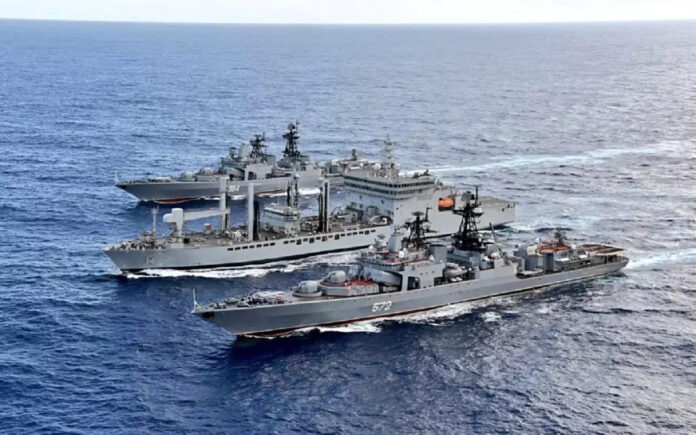New Delhi: India is preparing to host the prestigious Malabar naval exercise alongside the United States, Japan, and Australia in the Bay of Bengal this October. The decision comes amidst escalating regional tensions fueled by China’s assertive actions in the South China Sea and its expanding footprint across the Indian Ocean Region (IOR).
The 28th edition of the Malabar exercise, focusing on advanced anti-submarine warfare, will be conducted on India’s eastern seaboard in October to enhance military interoperability among the four countries, defence sources told TOI.
“Malabar will witness complex surface, anti-air and anti-submarine warfare drills, along with joint manoeuvres and advanced tactical exercises, to hone war-fighting skills. There is no plan to invite a fifth country for the exercise as of now,” a source said.
Improving Military Coordination and Capability
Planned for India’s eastern seaboard, the 28th edition of the Malabar exercise will emphasize advanced anti-submarine warfare and extensive naval maneuvers. Defense sources underscore its critical role in enhancing military interoperability among the four participating nations, according to media reports.
Challenging Tactical Scenarios and Strategic Goals
According to sources within the defense establishment, the exercise will include detailed drills in surface warfare, anti-aircraft operations, and anti-submarine warfare. These activities aim to enhance combat proficiency and reinforce joint operational tactics essential for maritime security in the Indo-Pacific region. Importantly, there are currently no intentions to involve additional countries beyond the core Quad alliance this year.
Also Read | China Accuses Philippine Warships of Damaging Reef in South China Sea
Evolution and Significance in Regional Context
Starting as a bilateral initiative between India and the US in 1992, the Malabar exercise has transformed into a multinational effort with regular participation from Japan and Australia. Recent editions have taken place off the coasts of Sydney and Yokosuka, highlighting its increasing strategic significance in promoting regional stability and securing maritime trade routes.
Tarang Shakti and Readiness for Multi-National Air Combat
In a broader military readiness context, India is preparing to host its inaugural Tarang Shakti air combat exercise in August-September. This exercise will feature participation not only from Quad members but also from air forces of nations including the UK, France, Germany, UAE, and Singapore, highlighting extensive international collaboration to enhance air combat capabilities.
Also Read | India to Trial Coking Coal Imports from Mongolia in July, Sources Say
Mounting Concerns Regarding China’s Strategic Ambitions
These military exercises are set against the backdrop of heightened concerns over China’s assertive actions in the South China Sea, marked by expansive territorial claims and construction of artificial islands. Similar activities are observed along India’s land borders and its strategic interests in the Indian Ocean, especially concerning developments in East Africa.
Enhanced Military Alliances and Strategic Partnerships
India has been proactively broadening its military alliances with Quad nations and other key allies through bilateral and multilateral agreements. These agreements enable reciprocal logistical support for naval vessels and aircraft, reinforcing collective security measures to uphold stability in the Indo-Pacific region amid shifting geopolitical dynamics.
Also Read | Kyiv Targeted: Russia’s Missile Strikes Leave Devastation in Ukraine
Present Deployments and Global Engagements
Prior to the Malabar exercise, India’s INS Shivalik frigate and P-8I long-range maritime patrol aircraft are actively involved in RIMPAC, the largest naval exercise globally hosted in Hawaii. These engagements underscore India’s naval capabilities and dedication to international maritime security across a span of over 9,000 nautical miles from its shores.
Fostering Stability in the Indo-Pacific Through Collective Efforts
In essence, the upcoming Malabar naval exercise demonstrates India, the US, Japan, and Australia’s commitment to safeguarding a free, open, and inclusive Indo-Pacific region. Amidst increasing regional challenges from China, the exercise seeks to bolster stability through strengthened cooperation, shared strategic goals, and robust joint military capabilities.



